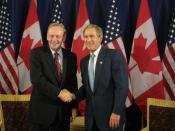Can Canada Survive? ---The largely unexpected results of the Q referendum on sovereignty in Oct 1995 gave rise to an existential crisis of unprecedented importance in the history of Canada.(5) ==C and Q: where r we now? ---After decades of procrastination, the government of C has finally begun to develop a plan to deal with the possible separation of Q. the main elements of the plan to have emerged thus far are 1. Insistence on the rule of law, thus excluding a unilateral declaration of independence 2. Refusal to be bound by any future referendum in which the separation question is unclear.
3. Demand for a supermajority (greater than 50%+1) before recognizing the result of a future referendum 4. The partition of Q in case of separation it is argued in the paper that the first tow elements of the plan are reasonable and useful, but that the latter two elements are impractical and dangerous because they have the effect of making a legal separation impossible and may drive Q's leader into reckless adventurism (19) ---Movement in that direction achieved by consultation, administration and legislation rather than constitutional amendment, might keep Q in C (21) ---The second element of the emerging federal position is that, in any future Q referendum on separation, the rest of the country will have to approve the wording of the question if the result is to be taken seriously.
The question will have to deal unambiguously with independence and separation from C. Legally, the government of Q can ask whatever it wants in a referendum, but it cannot expect questions that assume the reality of a hypothetical partnership of association with C to carry any weight in the rest f the county. (23) --- Again, this is a great step forward. If the sovereignists hold as many referendums as they want on whatever question they choose, sooner or later they will find a way to elicit a Yes vote from the Q electorate. There should be some limitation on the frequency with which such referendums can be held - perhaps once a generation, on Toms Jefferson's principle that "the earth belongs in usufruct to the living", so that constitutions should be renewed every generation; but until that limitation is established, consultation on the question is a step towards protection C's interests.(23) ---Several statements by Jean Chrétien and Stéphane Dion suggest that a majority greater than 50%+1 will be required in a future referendum on separation. (23-24) ---Federal ministers have now said several times that, if C is divisible, so is Q, and these statements have conjured up a burgeoning partition movement. Demands are now being made for C to retain sovereignty over not just the Indians and Inuit of northern Q, but also the anglophone communities along the Ontario border as well as the anglophone and allophne areas of Montréal.(24) ---I was born and raised in the US, where I grew up believing that the nation is one and indivisible...I would apply the same reasoning in C to the separation of other provinces - but not to Q. Most of the francophones of Q - the large majority of the province - think of themselves, as a people separate from the rest of Canadians, and a democracy cannot keep separate peoples together by force without ceasing to be a democracy. If a majority of Q's voters, responding to a clear question, decide the no longer want to be part of C, we should proceed to negotiate the separation. (25-26) ---Canada's principal threat to its existence comes from a problem that is in a sense everyone's in this day and age. Some have calculated that the number of "nations" is somewhere in the several thousands in our world. That each should have a state is utterly impossible. We need to find ways of coexistence of national groups under the same political umbrella, which can win their free consent. The multinational empires of yesterday have to e succeeded by multinational democratic states tomorrow. (30) ===Constitutional reform: the god that failed ---Q's attempt to leave c, on two occasions, was to be triggered by a majority vote in a provincial referendum. One of the prime reasons for the defeat of the Meech lake accord was the attempt to exclude the public, revealed by the remarkable secretive process of its fashioning, which was to be followed by its implementation by legislative resolutions orchestrated by cabinet leadership. (56) ---This role for referenda contrasts dramatically with the purposes that drove the 1980 federal government proposals to incorporate referenda into the amending process. (57) ===Q is not an island ---Similar divisions between (and within) English-speaking C and Q exist where the question of recourse to the Supreme Court to adjudicate the legality of Q's secession is concerned; regarding the question of Q's partition; of the pursuit of a Plan B approach (plans for the terms of a possible break-up pursuant to a third Q referendum) as opposed to a Plan A approach (attempts to work out a different federal arrangement obviating the need for a third Q referendum) to Q's demands. (115) ---The crises we have been living through - the 1980 Q referendum, patriation, the failures of Meech and Charlottetown, the 1995 Q referendum- constitute the skein of a lived history that cannot be wished away. (115) ---One obvious turning-point would be a majority of 50%+1 voting in favor of Q sovereignty in some future q referendum; another might be some new twist or turn in the endless language debate in Q, especially Montreal, always threatening to boil over; a third might be a growing feistiness in Western C, unwilling to allow the old central Canadian stranglehold over federal power to work as before. Any one of these could bring us back to the constitutional drawing board in search of arrangements that just might work. (116) ---"Most of the francophones of Q- the large majority of the province- think of themselves as a people separate from the rest of Canadians, and a democracy cannot keep separate peoples together by force without ceasing to be a democracy. If a majority of Q's voters, responding to a clear question, decide they no longer want to be part of C, we should proceed to negotiate the separation." - Thomas Flanagan argues. (119)





